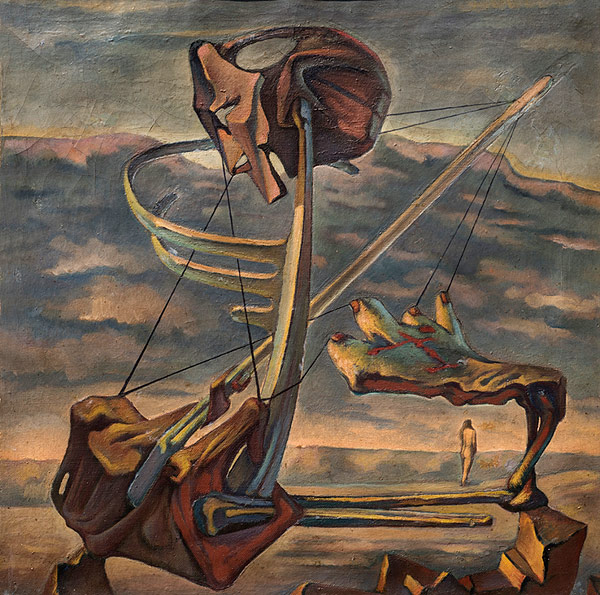Ramses Younan (Minya, 1913 - Cairo, 1966), was an Egyptian painter and writer.
Ramses Younan created in 1939, along with Georges Henein, Ikbal El Alaily and Edmond Jabès, the surrealist journal La Part du Sable. He was also a prominent member of the trotskyist group Art et Liberté since 1939, and edited the magazine El Magalla El Guedida between 1943 and 1945. Both hostile to British colonialism, Hitler and Stalin, Younan published his own Arabic translations of works and essays by Albert Camus, Franz Kafka and Arthur Rimbaud.
In 1947, Younan participated in the International Surrealist Exhibitions in Paris and Prague and signed Rupture Inaugurale, the collective manifesto published by Parisian Surrealists.His first personal exhibition was held in 1948 at the Gallery Nina Dausset (Paris). He also published in 1948 a dialog with Henein, Notes sur une ascèse hystérique, strongly criticizing Surrealist automatism.
Younan returned to Cairo in 1956 and faced an increasingly stifling political and cultural climate, but remained true to his principles and his views on art and freedom.Wikipedia
Ramses Younan created in 1939, along with Georges Henein, Ikbal El Alaily and Edmond Jabès, the surrealist journal La Part du Sable. He was also a prominent member of the trotskyist group Art et Liberté since 1939, and edited the magazine El Magalla El Guedida between 1943 and 1945. Both hostile to British colonialism, Hitler and Stalin, Younan published his own Arabic translations of works and essays by Albert Camus, Franz Kafka and Arthur Rimbaud.
In 1947, Younan participated in the International Surrealist Exhibitions in Paris and Prague and signed Rupture Inaugurale, the collective manifesto published by Parisian Surrealists.His first personal exhibition was held in 1948 at the Gallery Nina Dausset (Paris). He also published in 1948 a dialog with Henein, Notes sur une ascèse hystérique, strongly criticizing Surrealist automatism.
Younan returned to Cairo in 1956 and faced an increasingly stifling political and cultural climate, but remained true to his principles and his views on art and freedom.Wikipedia









